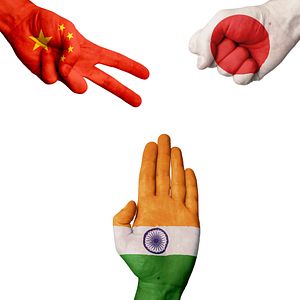On the eve of the Indian Prime Minister Narendra Modi’s visit to Japan, a think-tank in New Delhi hosted a conference on China entitled a “New Type of Partnership Between Big Powers: Sino-Indian Relations.” The conference was organized by the Observer Research Foundation (ORF) in collaboration with the China Foreign Affairs University (CFAU). The seminar deliberated on the ways and means to deepen the relationship between the two Asian powers in the changing geopolitical atmosphere.
The topic of China loomed large during Prime Minister Modi’s four day trip to Kyoto and Tokyo in Japan. Every statement and agreement made in Japan could be interpreted through the prism of India’s relations with China. For example, Prime Minister Modi said that “everywhere around us, we see an 18th century expansionist mind-set: encroaching on another country, intruding in others’ waters, invading other countries and capturing territory.”
China did not take Modi’s statement in good spirit. A Chinese state-owned newspaper, Global Times, noted in an editorial that “Japanese and Western public opinion view Modi’s remarks as a clear reference to China, although he did not mention China by name. This interpretation made some sense because Modi is more intimate to Tokyo emotionally. Therefore, it is perhaps a fact that he embraces some nationalist sentiments against China.”
The editorial further added that “the increasing intimacy between Tokyo and New Delhi will bring, at most, psychological comfort to the two countries. What is involved in China-India relations denotes much more than the display of the blossoming personal friendship between Modi and Abe. After all, Japan is located far from India. Abe’s harangue on the Indo-Pacific concept makes Indians comfortable. It is South Asia where New Delhi has to make its presence felt. However, China is a neighbor it can’t move away from. Sino-Indian ties can in no way be counterbalanced by the Japan-India friendship.”
Indian foreign policy cannot afford to develop close relations with Japan at the cost of China. Even though Beijing has traditionally been seen as a rival to India, India cannot discount the fact that a deeper economic and strategic relationship with China is a must in order for it to realize its domestic economic interests and geopolitical vision. This is despite the fact that China is a one-party Communist state while India is the world’s largest democracy.
Contrary to the popular view that a deeper engagement with Tokyo is important to balance the rising influence of China in Asia, New Delhi would lose out by advocating this worldview. It would lose the leverage it enjoys as a non-aligned, independent power.
Professor Su Hao of CFAU, who attended the conference in New Delhi, notes: “Yes, I know Japan is trying to woo India and make it a part of the Western axis which is aimed at containing China, but New Delhi is known to take an independent stand which suits its larger political and geopolitical interests.”
Su Hao also underlined the importance of “creating a new Asia which is based on the shared interest of India and China. Japan is not a voice of larger Asia, [as] it is closer to the West.”
Considering the history of acrimony and animosity between New Delhi and Beijing, Japan is seen as a natural ally for India. The case for closer relations with Japan is further strengthened by Japan’s own rivalry with China in the East China Sea. However, an entente between Japan and India is not in the interests of India if aimed at containing China. It will have repercussions at the Sino-Indian border and inject tension into their relationship and into South Asia as China might further strengthen its relationships with India’s neighbors.
India cannot remain a prisoner of history forever. The defeat of India at the hands of China in 1962 cannot remain a cause for permanent distrust. India itself was also responsible for the war with China.
“We cannot forget history but at the same time we cannot remain in the prison cell of the past forever. We have to come out. Today China is more than ever before willing to extend the hands of friendship across the Himalayas,” according to Professor Su Hao. He also added that “Japan should also behave like an Asian nation as this will ease the tension in the region and Japan can become, along with New Delhi and Beijing, a part of the emerging Asian architecture.”
Many Indian foreign policy hawks suggest that India should develop a strategic alliance with Japan in order to contain Chinese influence in the region and block its rising supremacy in Asia. But such a brazen approach will not serve India’s larger economic and geostrategic interests. India needs China for economic investment and for stabilizing Afghanistan. Both India and China have large financial and strategic stakes in Afghanistan.
Later this month, Chinese President Xi Jinping will visit India. This will be a historic opportunity for India and China to rebuild and strengthen their ties, as in the 1950s.

































